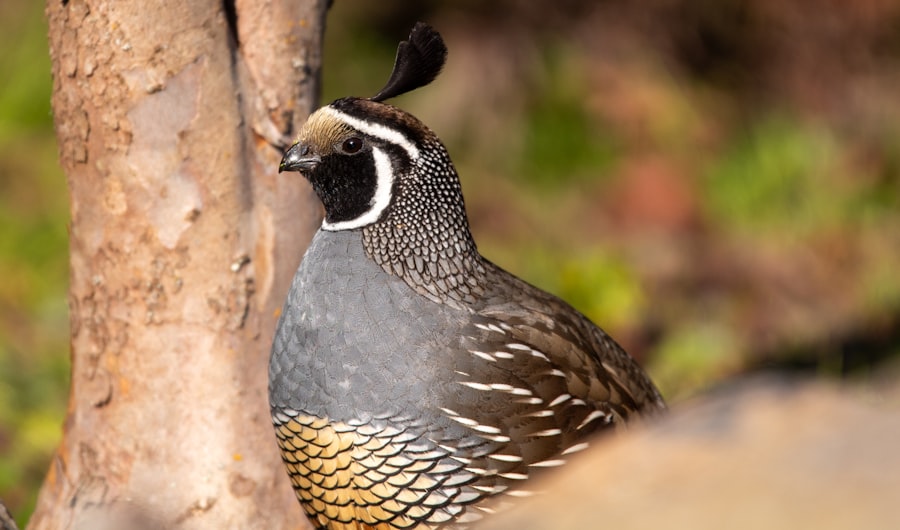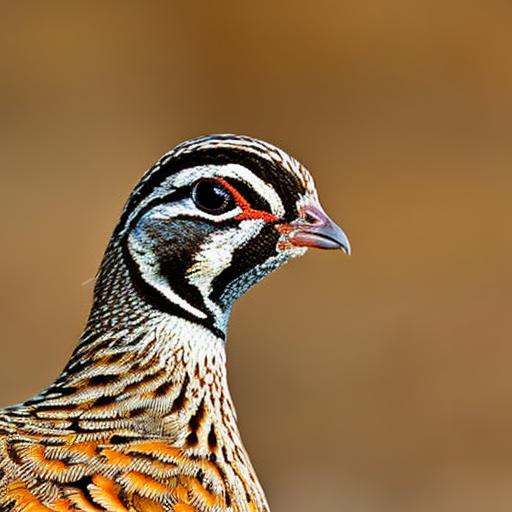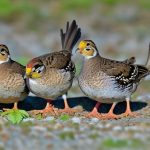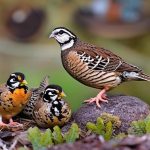When it comes to choosing the right quail breed for your farm or backyard, there are several factors to consider. First and foremost, you’ll want to think about the purpose of raising quails. Are you looking to raise them for their eggs, meat, or simply as pets? Different quail breeds have different characteristics that make them more suitable for specific purposes. For example, if you’re interested in raising quails for their eggs, you might want to consider breeds like Coturnix or Bobwhite quails, which are known for their prolific egg-laying abilities. On the other hand, if you’re looking to raise quails for meat, breeds like Jumbo Coturnix or Italian quails might be more suitable due to their larger size and meatier bodies.
Another important factor to consider when choosing a quail breed is the climate and environment in which you’ll be raising them. Some quail breeds are more adaptable to different climates and can thrive in a wider range of temperatures, while others are more sensitive and require specific environmental conditions to thrive. For example, if you live in a hot and humid climate, you might want to consider breeds like Coturnix quails, which are known for their heat tolerance. On the other hand, if you live in a colder climate, breeds like Bobwhite quails might be more suitable due to their cold-hardy nature.
In addition to considering the purpose and environmental factors, it’s also important to think about the temperament and behavior of different quail breeds. Some breeds are known for being more docile and easy to handle, making them ideal for beginners or those looking to raise quails as pets. Other breeds might be more skittish and flighty, requiring more careful handling and management. By taking all of these factors into consideration, you can choose the right quail breed that best suits your specific needs and circumstances.
Key Takeaways
- When choosing a quail breed, consider factors such as egg production, temperament, and size to find the right fit for your needs.
- Create an ideal quail habitat by providing adequate space, shelter, and protection from predators to ensure the health and well-being of your quails.
- Ensure proper feeding and nutrition for quails by offering a balanced diet that includes protein, vitamins, and minerals to support their growth and egg production.
- Monitor the health and wellness of your quails by observing their behavior, checking for signs of illness, and providing regular veterinary care when needed.
- When breeding and incubating quail eggs, maintain proper temperature and humidity levels, and handle the eggs with care to increase the chances of successful hatching.
- Manage quail flocks by establishing a routine for cleaning, handling, and monitoring the birds to promote a safe and productive environment.
- Be aware of legal considerations for keeping quails in South Africa, such as obtaining the necessary permits and complying with regulations related to housing and care of the birds.
Creating the Ideal Quail Habitat
Creating the ideal habitat for your quails is essential for their health, well-being, and productivity. When it comes to housing quails, there are several key considerations to keep in mind. First and foremost, you’ll want to provide enough space for your quails to move around comfortably. Overcrowding can lead to stress, aggression, and decreased egg production, so it’s important to provide ample space for your quails to thrive. A general rule of thumb is to provide at least 1 square foot of space per quail, but more space is always better if possible.
In addition to space considerations, it’s important to provide a safe and secure housing structure for your quails. This can be in the form of a coop, aviary, or cage, depending on the number of quails you have and the space available. The housing structure should be predator-proof, with sturdy walls and a secure roof to protect your quails from potential threats like foxes, raccoons, and birds of prey. It’s also important to provide adequate ventilation and insulation to ensure that your quails are comfortable in all weather conditions.
Furthermore, providing appropriate bedding material is crucial for maintaining a clean and healthy habitat for your quails. Good bedding material should be absorbent, easy to clean, and comfortable for your quails to walk and rest on. Common bedding materials for quails include straw, wood shavings, and sand. By creating an ideal habitat for your quails, you can ensure that they are happy, healthy, and productive.
Feeding and Nutrition for Quails
Feeding and nutrition are crucial aspects of raising healthy and productive quails. A well-balanced diet is essential for ensuring that your quails have the energy and nutrients they need to thrive. When it comes to feeding quails, there are several key considerations to keep in mind. First and foremost, it’s important to provide a high-quality commercial feed specifically formulated for quails. These feeds are specially designed to meet the nutritional needs of quails at different stages of life, whether they are chicks, growers, layers, or breeders.
In addition to commercial feed, it’s also important to provide supplemental treats and fresh foods to ensure that your quails have a varied and balanced diet. This can include treats like mealworms, fruits, vegetables, and greens, which provide additional nutrients and enrichment for your quails. It’s important to offer these treats in moderation and ensure that they do not make up more than 10% of your quails’ total diet.
Furthermore, providing access to clean water at all times is essential for maintaining the health and well-being of your quails. Quails require constant access to fresh water for drinking and regulating their body temperature, especially during hot weather. It’s important to regularly clean and refill water containers to prevent contamination and ensure that your quails have access to clean water at all times.
By paying close attention to feeding and nutrition, you can ensure that your quails have everything they need to stay healthy, productive, and thriving.
Health and Wellness of Quails
Maintaining the health and wellness of your quails is essential for their overall well-being and productivity. There are several key aspects to consider when it comes to keeping your quails healthy. First and foremost, it’s important to monitor your quails regularly for any signs of illness or injury. This can include observing their behavior, checking their droppings, and inspecting their feathers and skin for any abnormalities. Early detection of health issues can help prevent the spread of disease and ensure that your quails receive prompt treatment when needed.
In addition to regular monitoring, it’s important to provide a clean and sanitary environment for your quails. This includes regularly cleaning their housing structure, providing fresh bedding material, and maintaining clean water and feed containers. Good hygiene practices can help prevent the spread of disease and parasites among your quail flock.
Furthermore, it’s important to provide regular access to dust baths for your quails. Dust bathing is a natural behavior for quails that helps them maintain healthy skin and feathers by removing excess oils and parasites. Providing a dust bath area with fine sand or dusting material can help keep your quails clean and healthy.
Lastly, it’s important to establish a relationship with a veterinarian who is knowledgeable about quail health and can provide guidance on preventative care and treatment options when needed. By staying proactive about the health and wellness of your quails, you can ensure that they live long, healthy lives.
Breeding and Incubating Quail Eggs
Breeding and incubating quail eggs is an exciting aspect of raising quails that requires careful planning and attention to detail. When it comes to breeding quails, it’s important to ensure that you have a balanced ratio of males to females in your flock. A general rule of thumb is to have one male for every four females to prevent overbreeding and aggression among the males.
Once you have a balanced ratio of males to females, it’s important to provide suitable nesting areas for your quails. This can include providing nesting boxes or areas with suitable nesting material where your female quails can lay their eggs in privacy.
After collecting the eggs from the nesting areas, it’s important to store them properly before incubation. Quail eggs should be stored in a cool, humid environment with consistent temperature control until they are ready for incubation.
When it comes to incubating quail eggs, it’s important to use a reliable incubator with accurate temperature and humidity control. The optimal temperature for incubating quail eggs is around 37.5 degrees Celsius with a humidity level of around 50-60%. It’s important to regularly monitor the temperature and humidity levels throughout the incubation period to ensure successful hatching.
After around 17-18 days of incubation, the quail eggs should start hatching. It’s important to provide a safe and warm environment for the newly hatched chicks with access to food and water. By carefully managing the breeding and incubation process, you can successfully raise healthy quail chicks.
Managing Quail Flocks

Managing a quail flock requires careful planning and attention to detail in order to ensure their health, well-being, and productivity. One key aspect of managing a quail flock is maintaining a balanced ratio of males to females. Overbreeding can lead to stress and aggression among the males as they compete for mating opportunities with the females. By maintaining a balanced ratio of males to females, you can prevent overbreeding and ensure a harmonious flock dynamic.
In addition to managing the male-to-female ratio, it’s important to regularly monitor the overall health and behavior of your quail flock. This can include observing their feeding habits, social interactions, and overall activity levels. Any changes in behavior or signs of illness should be addressed promptly in order to prevent the spread of disease among the flock.
Furthermore, it’s important to provide regular access to dust baths for your quails as part of their natural grooming behavior. Dust bathing helps keep their skin and feathers healthy by removing excess oils and parasites. Providing a suitable dust bath area with fine sand or dusting material can help keep your quails clean and content.
Lastly, it’s important to regularly clean and maintain their housing structure in order to provide a clean and sanitary environment for your quail flock. This includes regularly cleaning their coop or cage, providing fresh bedding material, and ensuring that water and feed containers are kept clean at all times.
By carefully managing your quail flock with attention to detail and proactive care, you can ensure that they live healthy, happy lives.
Legal Considerations for Keeping Quails in South Africa
When it comes to keeping quails in South Africa, there are several legal considerations that potential quail owners should be aware of. In South Africa, keeping quails is regulated by various laws and regulations that aim to ensure the welfare of these birds as well as public health and safety.
One key legal consideration is obtaining the necessary permits or licenses required for keeping quails. In South Africa, certain species of quails are protected under conservation laws due to concerns about declining populations in the wild. As such, it’s important for potential quail owners to research the specific legal requirements for keeping quails in their area and obtain any necessary permits from local authorities.
In addition to obtaining permits or licenses, potential quail owners should also be aware of any zoning regulations or restrictions related to keeping poultry on their property. Some municipalities may have specific regulations regarding the number of birds allowed per property or restrictions on certain types of poultry housing structures.
Furthermore, potential quail owners should also be aware of any biosecurity measures required for keeping poultry in South Africa. This can include measures aimed at preventing the spread of diseases such as avian influenza or Newcastle disease among poultry flocks.
By staying informed about the legal considerations for keeping quails in South Africa, potential owners can ensure that they are in compliance with all relevant laws and regulations while providing a safe and healthy environment for their birds.
This includes understanding the requirements for obtaining a permit to keep quails, as well as any restrictions on the number of birds that can be kept. Additionally, owners should be aware of the regulations regarding the housing and care of quails, such as the minimum space requirements and proper sanitation practices. Staying informed about legal considerations can help quail owners avoid potential fines or penalties, while also promoting responsible and ethical animal husbandry practices.
If you’re interested in keeping quails in South Africa, you may also want to check out this informative article on PoultryWizard about the importance of having a heater for a chicken coop. It provides valuable insights into creating a comfortable and safe environment for poultry, which can be beneficial for quails as well. Learn more about the importance of a heater for a chicken coop here.
FAQs
What are quails?
Quails are small, ground-dwelling birds that are often kept for their eggs and meat. They are known for their distinctive calls and are found in various parts of the world, including Africa.
Why keep quails in South Africa?
Quails are kept in South Africa for their eggs and meat, as they are a good source of protein. They are also relatively easy to care for and can be kept in smaller spaces compared to other poultry.
What do quails eat?
Quails are omnivorous and eat a diet that consists of seeds, insects, and small plants. In captivity, they can be fed a commercial quail feed or a mixture of grains and protein sources.
How do you care for quails in South Africa?
Quails require a clean and secure living space, access to fresh water, and a balanced diet. They also need protection from predators and proper ventilation in their housing.
Are there any regulations for keeping quails in South Africa?
In South Africa, there are regulations regarding the keeping and breeding of quails. It is important to familiarize yourself with these regulations before starting a quail farming operation.
What are the benefits of keeping quails in South Africa?
Keeping quails in South Africa can provide a sustainable source of eggs and meat, as well as an additional income stream for farmers. Quails are also relatively low maintenance compared to other poultry.
Meet Walter, the feathered-friend fanatic of Florida! Nestled in the sunshine state, Walter struts through life with his feathered companions, clucking his way to happiness. With a coop that’s fancier than a five-star hotel, he’s the Don Juan of the chicken world. When he’s not teaching his hens to do the cha-cha, you’ll find him in a heated debate with his prized rooster, Sir Clucks-a-Lot. Walter’s poultry passion is no yolk; he’s the sunny-side-up guy you never knew you needed in your flock of friends!






